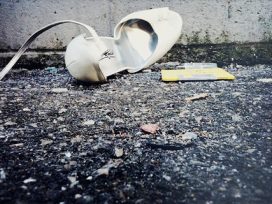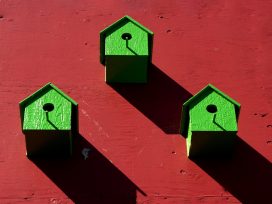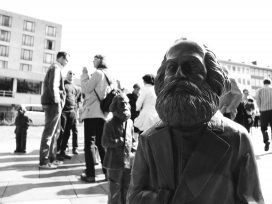 Almantas Samalavicius: I see your book The Economics of Happiness not only as a thought-provoking challenge to contemporary economic assumptions that dominate many parts of the globe, but also as a tool with which we can reconsider, rework and dismantle the present systems used to measure economic “growth” and wellbeing in terms of endlessly rising consumption. How did you arrive at your present understanding of the contemporary economic paradigm as being a road leading to nowhere? What was the most important factor in urging you to look for new ways of understanding economics and the concept of wellbeing?
Almantas Samalavicius: I see your book The Economics of Happiness not only as a thought-provoking challenge to contemporary economic assumptions that dominate many parts of the globe, but also as a tool with which we can reconsider, rework and dismantle the present systems used to measure economic “growth” and wellbeing in terms of endlessly rising consumption. How did you arrive at your present understanding of the contemporary economic paradigm as being a road leading to nowhere? What was the most important factor in urging you to look for new ways of understanding economics and the concept of wellbeing?
Mark Anielski: My own path to understanding the inherent shortcomings of our current economic model focused solely on economic growth is described in my book. I was schooled in neoclassical economics, forestry and financial accounting, with an interest in theology. This diversity of education has given me a variety of lenses through which to view the world. I was originally schooled in accounting, which taught me the importance of taking a physical inventory of assets, accounting for liabilities and full cost accounting to inform decisions. I learned that our modern accounting system dates back to the Renaissance, when the Franciscan monk and mathematician Luca Pacioli and Leonardo da Vinci developed the double-entry bookkeeping system we still use today. Luca counselled business people in Venice, which at the time included guilds or cooperatives. He taught that a wise business person should pay attention to the physical inventory and the conditions of the assets and liabilities (risks) accounted for in a balance sheet that contribute to the flourishing and resilience of both the business enterprise and the household associated with and dependent on it. He also taught that all wealth belonged to God, the Creator, and that taking a regular account of the performance of an enterprise was effectively an accounting to God for the wise stewardship of the assets that were key to a flourishing enterprise and the Venetian economy. We know that Venice flourished during the Renaissance thanks to the wise guidance of Luca and the design talents of Leonardo.
After taking articles as a chartered accountant, I returned to the University of Alberta and studied economics and forestry. I was taught a series of beliefs that formed the “theology” of economics based on neoclassical economic theorems. I was taught to accept, without question, a set of theorems and beliefs in which human beings are reduced to income-constrained, rational consumers and utility maximizers operating within an economy where prices for goods and services and income distribution are determined through the dynamics of supply and demand. The central belief within neoclassical economics is that “growth is good”, that there are no limits to growth and that the key measure of progress is the Gross Domestic Product (GDP).
I then recognized the flaws and inconsistencies in the theology of neoclassical economics. What if all individuals are not motivated by utility maximization and materialism? Does the model fall apart if people act with compassion and altruism and choose not to consume but would rather live a life of simplicity? What is utility anyway? Is a “util” a unit of happiness? Can happiness be measured and monetized? I realized that markets were never perfect and were often ignorant or blind to the conditions of real assets such as natural capital and ecosystem services. There was no accounting by nations or corporations for the value of natural assets in their system. There was no accounting of risks to the environment from unsustainable economic growth or the damaging effects of industry on the environment. In Luca’s terms, there was no accounting of the real liabilities or risks to the capacity of both business and communities to flourish. Moreover, I learned that all nations and governments around the world operate without a full inventory of their human, social, natural and built assets: governments were operating without a balance sheet. I knew that corporations like Coca Cola could not operate without a balance sheet that included the value of their trademark as an asset.
Perhaps the most important thing I realized is that our entire economic system assumes that money expresses the true value of things and is a perfect measure of utility, GDP or any other goods and services in society. Yet how could this be if money itself has no inherent worth or value? The word “value” comes from the Latin valorum which means to be worthy or strong. I realized that most people, including economists, have no idea about what money is, how it is created and who creates it. I learned that money has no inherent or genuine value in that it is created out of thin air when governments either issue new currency or private banks issue bank loans such as mortgages, which is a French word meaning “a pledge unto death”. I learned that the majority (98 per cent) of modern money is created as private bank debt, which itself is not connected to the real wealth of nations. That means that money is debt. I also learned that the issue of money as debt grows exponentially through the power of compound interest. Eventually, the growing mountain of total outstanding debt in economies would become so huge that the economic system would suffer a catastrophic collapse because there was not enough money available to pay even the interest obligations on the debt. I realized that the reason economists and politicians kept calling for “more economic growth” as the path to sustained and improved wellbeing was because more GDP (more consumption and output of goods and services by business) was required to help manage the growing and unsustainable mountain of debt. Luca would be appalled that we were operating a modern economic system without a balance sheet of the real wealth of nations and a monetary system where money had no relationship to the real assets and liabilities that ultimately define the wellbeing and happiness of our lives and communities. I realized that, compared to a forest ecosystem, a global economy based on a belief in eternal growth fuelled by unsustainable debt was more akin to a cancer cell that would consume the very body, mind and soul of humanity without conscience.
I came to see that the belief in eternal economic growth and the collective ignorance of the nature and creation of money represented such a global blind spot that our good-ship Titanic was at risk of hitting an iceberg that threatened the wellbeing of humanity and nature. Moreover, there was no political leadership in any nation ready to acknowledge these realities and propose an alternative system.
These personal epiphanies led me to realize that I must write down my insights in my book. I completed my first manuscript by 31 October 2006 in just two short months and it was published in May 2007. Interest in the book exploded. I was interviewed on over 30 US radio stations to talk about happiness. But my focus was really warning people about the dangerous “iceberg” of unrepayable debt that was looming and threatening all humanity and the earth. I reminded people that solving the looming debt crisis would be the most important task and yet no one was talking about a solution. Then the financial crisis in the US in 2008 hit like an iceberg and suddenly people said that I must have been clairvoyant. I simply them that it was only a matter of time before the debt mountain would start to threaten the US economy and all other economies. Today, Europe is in the midst of a sovereign debt crisis with no practical solution. The US will soon follow. No nation, except perhaps China, will be immune to the financial debt tsunami that is building.
AS: While I was re-reading your book one of my friends spotted the title and inquired, “Is this Philosophy”? “Economics,” I replied. But his question might represent a somewhat typical reaction of many people, for whom “philosophy” seems to be the sphere of benign yet impractical concerns remote from reality; closer perhaps to the “economics of happiness”. Many principles discussed in your book, however, are applicable in practice. These range from an individual’s life to a company’s activities, as well as in regional and governmental policies, and you have provided numerous examples of how these are worked out. At the same time, no essential changes can be expected without a fundamental shift in human consciousness – Sulak Sivaraksa says that before attempting to change the world we should reshape our thinking. What do you think can be done to make these crucial changes in our thinking happen? How can we help people to understand that happiness could and should be a true concern of economics?
MA: Part of the shift necessary in moving from the current economy of consumption, materialism and eternal economic growth will require increasing awareness among all people about how this “matrix” actually operates and the underlying belief system that sustains the system. In many ways, we are all complicit in keeping this economic matrix alive by our collective state of ignorance. Moreover, we believe in the lie of scarcity and the myth of money. The economic system requires a collective state of ignorance about such things as the nature of money. In many senses we are also complicit in our consent to a system that has captured our souls and enslaved us in this culture of materialism. When people are truly aware of how the matrix operates and the illusion of money, then we may wake up and reclaim our sovereignty over money and over our birthright, which is to love.
The myopic economic system of debt and growth requires us to remain ignorant and enslaved by debt. When we educate ourselves about how the system actually works and then withdraw our consent and energy from the system, it will collapse in on itself. Raising consciousness is about increasing awareness. Once “we the people” wake up to the reality of the lie of scarcity and realize the truth of abundance, as revealed in nature, humanity will be free to pursue genuine happiness. For genuine happiness is rooted in the Greek definition of happiness: eudaimonia which literally means “wellbeing of spirit”. I believe that love will be the ultimate triumph over hedonism and fear.
AS: As you note in the introduction to your book, “In economics we have reduced humanity to a collection of individual, independent, utility-maximizing creatures. Success is defined by the accumulation of material and financial wealth over a lifetime. We are born into this free market ideology without questioning its morality or ethical foundations.” You even go so far as to call economics a form of religion and economists its high priests. Institutions and university departments seem unwilling to give up their infatuation with the present economic paradigm and its most widespread dogmas, despite the fact that some of these have been seriously challenged; calls for conceptual revision range from the visionary economic thinker E. F. Schumacher to the thinking worked out by ecological economics. What are the prospects of making the professional guild of economists reconsider? Do you see any cracks in what I would call the wall of professional ignorance?
MA: The prospect for a shift in the consciousness of economics is at hand. I would never have dreamed five years ago that a former chief economist of the World Bank, Joseph Stiglitz, would be leading an international conversation on alternative indicators of economic progress. And that a sitting US Federal Reserve chairman, Ben Bernanke, would give a keynote commencement speech to a US university entitled “The Economics of Happiness”. Yet these leading neoclassical economists have taken on a new language that is actually more closely aligned with the original Greek meaning of economics, oikonomia, meaning household stewardship. Increasingly, economics students are demanding a more meaningful and relevant economic education that relates to the real economy, one that should be concerned with the wellbeing not only of households but of nature as well. More economists are admitting that the GDP and national income accounting systems were never intended to provide measures of welfare or wellbeing. Some are joining a growing chorus of individuals supporting Bhutan’s efforts to advance a new economic paradigm based on wellbeing and happiness. I am hopeful that the former “dismal science” of economics will experience a Renaissance and possible redemption by returning to its Greek roots. Economics may ultimately return to a discipline that concerns itself with evaluating the conditions of wellbeing of households in relationship with natural systems, as I imagine Aristotle originally envisioned in Greece.
AS: In your book you introduce and discuss a new way of looking at economy and wellbeing – a concept of Genuine Wealth – as well as introducing a system enabling this concept to be applied in measuring individual, communal (even national) wellbeing. To what degree has this system of measurement been introduced in Canada? Have attempts to introduce it gone any further than those indicated in your book?
MA: The concept and model of Genuine Wealth came about from my own inquiry into the nature and language of economics. I had no idea that the word “wealth” comes from the thirteenth-century Old English words wela (wellbeing) and th (the conditions of). I reasoned that “genuine wealth” referred to the conditions of wellbeing that ultimately contributed most to our individual and collective wellbeing, including consideration for the importance of nature in our mental, physical, spiritual and emotional wellbeing. The word “genuine” simply means to live authentically and in accordance what we value most about the good life and our happiness.
The good news is that Canada has been a leader in advancing new measures of wellbeing. For the past ten years I have been working with a group of scholars in the development of the Canadian Index of Wellbeing (CIW), which precedes Bhutan’s development of the Gross National Happiness system of measurement. The CIW was launched in October 2011 and represents the first comprehensive wellbeing index that could be adopted by governments and communities around the world to assess and track changes using over 60 indicators of economic, social and environmental wellbeing. Unfortunately, as yet, no single municipal, provincial or federal government in Canada has adopted the CIW as its measurement of wellbeing and its reporting system.
I have personally been involved in developing Genuine Wealth and wellbeing indicators and reporting systems in communities in Canada, the US, China and Austria. Some of these are profiled in my book but more examples can be found on my website. I see a growing hunger for pragmatic systems of measuring wellbeing and incorporating these into existing planning and budgeting systems. This is the focus of my work now.
AS: The global system of power is changing. According to the sociologist Immanuel Wallerstein, this century will be marked by the emergence of new global players – China and India as well as several Latin American countries such as Brazil. You have recently served as senior adviser to the Chinese government on economic issues. As we both know, Schumacher was once a consultant to the Burmese government, urging it to reorient its economy. However, his views went against mainstream advice at the time. Is there a chance that the new Burmese government will resist the western concept of economic growth? And what is the attitude of the present Chinese authorities? Are there any prospects that China will finally find its own way of economic progress and understanding of wellbeing?
MA: I cannot comment on the legacy of Schumacher’s influence in Burma but I have great hopes that China could lead the world in a shift in our economic paradigm away from growth and debt-money systems to one of genuine wellbeing. Why am I so bullish about China? Because I have had the pleasure of serving as a senior economic advisor to China (2003-2006) on their national economic development policy they call xiaokang. I was asked to help them develop a set of xiaokang society indicators to guide their municipal and national economic development strategies.
Xiaokang is an ancient Confucian term that describes a society of modest means where people live relatively comfortably though simply. I learned that China had originally defined a target for xiaokang in the 1990s in terms of US$4,000 GDP per capita. The idea that a country as important as China might consider limits to economic growth was remarkable to me. I was used to economic development policies in Canada and the US without any limits to economic growth, despite evidence that natural, human and social capital might be unsustainable.
Xiaokang seemed to suggest a society that was based on the notion that genuine wellbeing was achieved when the majority of households had met their material needs, when people were living lives of moderation with equitable distribution of material needs for all. This very practical philosophy of moderation promises to yield a peaceful and harmonious society.
The philosophy of xiaokang seems to be closely aligned with Plato’s virtue of moderation or temperance. Temperance, sophrosyne in Greek, is defined as “moderation in action, thought or feeling; restraint”. Could China become a model for the rest of the world? China may have an important opportunity to show the world a new path to genuine economic development by adopting the concepts of Genuine Wealth to measure and manage its progress. This would represent a major departure from the current growth-based, economic development model dominated by British-American capitalism.
If China were to be successful in these efforts at “green GDP accounting” and in limiting its economic growth once xiaokang objectives have been met, it would make it the first nation in the world to fully adopt such practices of measuring genuine sustainable development.
During my November 2004 visit to Beijing I visited the Hall of Central Harmony (Zhong He Dian) in Beijing’s Forbidden City. Above the throne of the eighteenth-century Qing Dynasty Emperor Qianlong hangs a sign with his inscription that reads: “The Way of Heaven is profound and mysterious and the way of mankind is difficult. Only if we make a precise and unified plan and follow the doctrine of the mean can we rule the country well.” This is in accordance with the ancient Book of Rites which states: “When we handle matters properly and harmoniously without leaning to either side, all things on earth will flourish.” It seemed that I had found the DNA code for a new term emerging in the Chinese consciousness: “harmonious development”.
Until recently, as in all other nations, China’s economic progress has been measured in terms of increments in GDP. Political rewards for local, provincial and national leaders in China have been tied to GDP growth performance.
Unfortunately, China’s rapid economic growth has come at the price of growing ecological and social costs. Chinese officials are increasing concerned about the negative impact of high consumption of natural resources, natural resource shortages (particularly the scarcity of oil), the growing environmental problems due to air pollution from coal combustion, the growing gap between rich and poor, and between urban and rural households. Preliminary estimates of a “green GDP” for China suggest that roughly 15 per cent of China’s GDP is linked to environmental damage. This means that while China’s economy is boiling, its natural capital is depreciating rapidly without any accounting of such regrettable consequences.
There is a growing awareness that these environmental challenges and increasing social problems may eventually threaten the overall wellbeing of the nation. This is also true of other nations where rising inequality of income and material wealth ultimately undermines the social fabric or social capital of nations and ultimately leads to war.
This growing consciousness in China is leading to calls for new ways of measuring and rewarding progress in accordance with a philosophy the Chinese call “harmonious development”. Harmonious development, as distinguished from sustainable development, means development where economic, environmental and social factors are closely integrated and balanced – in harmonious balance. This means achieving a harmonious balance between human wellbeing and nature, and between the needs and wellbeing of citizens in urban and rural areas across the diverse regions of China.
While some may not share my hope that China could lead the world out of the current malaise of capitalism, I believe that it has the capacity to demonstrate to the world that a society of genuine moderation, without debt-money, is possible.
AS: Among several non-conventional economic examples cited in your book you mention Bhutan – a Buddhist country that was the first to introduce the index of Gross National Happiness to measure economic success and other aspects of the quality of life. To many, this is an exciting example to be followed. However, other Buddhist countries have so far chosen to look westwards for standards of economic growth and welfare. My own experience in South Korea, where I was a visiting professor two years ago, indicates that the modernist ethos has overtaken traditional wisdom. Do you think Bhutan is able to give some development guidelines for the future?
MA: Bhutan, known as the Dragon Kingdom, has been a leader among nations by advancing a new economic paradigm of wellbeing and happiness based on Gross National Happiness. Though it is a small and isolated Buddhist kingdom of only 700,000 people, it has a remarkable opportunity to show the world how to develop and implement this paradigm. In April of 2012, I attended a high-level meeting in New York at the United Nations with the Prime Minister of Bhutan and 700 dignitaries to develop a practical roadmap for implementing this new economic paradigm. This included some of the most important economists and psychologists who are developing a new economics of happiness. Bhutan’s efforts promise to provide an important benchmark internationally on how to development and implement a new economic model where progress will be measured in terms of improvements in wellbeing rather than changes in GDP, material consumption and money changing hands. There is a lot of hope invested in Bhutan’s efforts. Its experiment with GNH is a sign that a new economic model is both possible and viable, one that focuses on wellbeing rather than a narrow view of economic growth. I believe Schumacher would be pleased by Bhutan’s efforts.
However, whether other nations will commit to a genuine investment in similar paradigm shifts in their own countries, or whether the OECD or the G20 nations would adopt a similar economic paradigm of wellbeing remains to be seen.

 Almantas Samalavicius: I see your book The Economics of Happiness
Almantas Samalavicius: I see your book The Economics of Happiness




